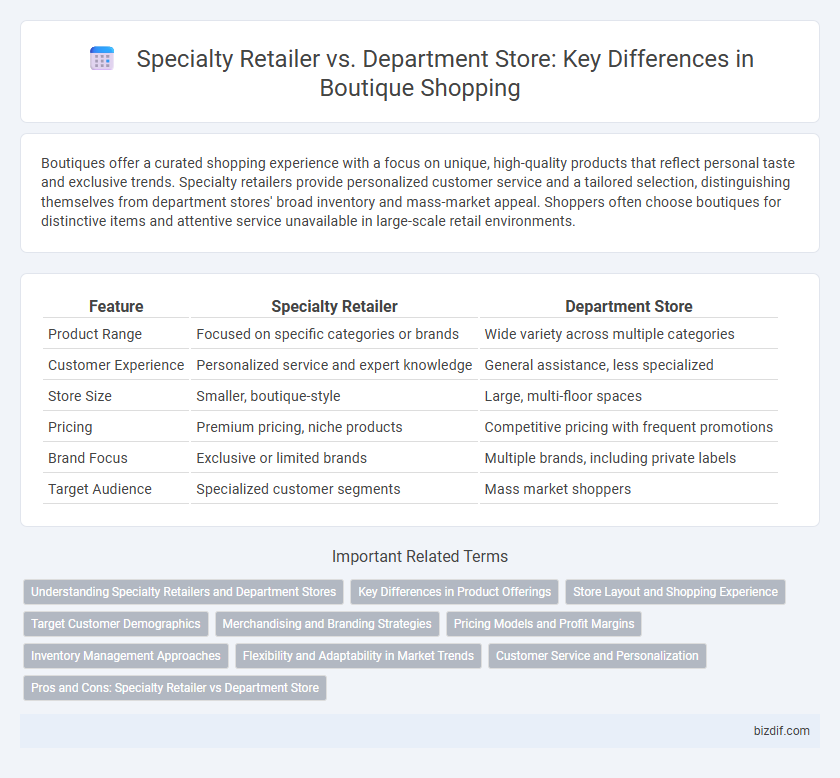Boutiques offer a curated shopping experience with a focus on unique, high-quality products that reflect personal taste and exclusive trends. Specialty retailers provide personalized customer service and a tailored selection, distinguishing themselves from department stores' broad inventory and mass-market appeal. Shoppers often choose boutiques for distinctive items and attentive service unavailable in large-scale retail environments.
Table of Comparison
| Feature | Specialty Retailer | Department Store |
|---|---|---|
| Product Range | Focused on specific categories or brands | Wide variety across multiple categories |
| Customer Experience | Personalized service and expert knowledge | General assistance, less specialized |
| Store Size | Smaller, boutique-style | Large, multi-floor spaces |
| Pricing | Premium pricing, niche products | Competitive pricing with frequent promotions |
| Brand Focus | Exclusive or limited brands | Multiple brands, including private labels |
| Target Audience | Specialized customer segments | Mass market shoppers |
Understanding Specialty Retailers and Department Stores
Specialty retailers concentrate on a specific product category or target market, offering curated selections and personalized service to enhance customer experience. Department stores provide a wide range of merchandise across multiple categories, including apparel, home goods, and cosmetics, under one roof to cater to diverse consumer needs. Understanding these distinctions helps shoppers choose between the focused expertise of specialty retailers and the variety and convenience of department stores.
Key Differences in Product Offerings
Specialty retailers focus on a narrow product range, offering highly curated and unique items tailored to specific customer preferences. Department stores provide a broad assortment of goods across multiple categories, including clothing, home goods, and cosmetics, catering to a wider audience. The key difference lies in depth versus breadth: boutiques deliver specialized, often premium products, while department stores emphasize convenience with diverse selections.
Store Layout and Shopping Experience
Specialty retailers feature curated store layouts that highlight specific product categories, creating an intimate shopping experience tailored to niche markets. Department stores utilize expansive floor plans subdivided into distinct sections, allowing customers to explore diverse product lines under one roof. The focused ambiance in specialty boutiques often leads to personalized service, contrasting with the broader, self-service approach common in department stores.
Target Customer Demographics
Specialty retailers primarily target niche customer segments with specific interests or needs, often attracting discerning shoppers seeking curated product selections and personalized service. Department stores appeal to a broader demographic, catering to diverse age groups and income levels by offering a wide variety of products under one roof. Boutique stores excel in serving affluent or trend-conscious consumers looking for unique, high-quality items not typically found in department store assortments.
Merchandising and Branding Strategies
Specialty retailers focus on curated product selections within niche markets, enabling targeted merchandising that highlights unique brand identity and customer experience. Department stores employ broad merchandising strategies, offering diverse product categories to attract a wide customer base while emphasizing multi-brand branding and convenience. Boutique branding strategies prioritize exclusivity and personalized service, contrasting with the mass-market appeal and standardized branding typical of department stores.
Pricing Models and Profit Margins
Specialty retailers often adopt value-based pricing models targeting niche markets, enabling higher profit margins due to unique, curated product selections and personalized customer experiences. Department stores typically implement competitive pricing strategies with broader product assortments, resulting in lower profit margins driven by high sales volume and economies of scale. Understanding these pricing models is crucial for optimizing profitability within the boutique and specialty retail sectors.
Inventory Management Approaches
Specialty retailers maintain focused inventories tailored to niche markets, enabling precise demand forecasting and faster stock turnover. Department stores manage extensive, diverse product ranges requiring complex inventory systems to balance stock levels across multiple categories and locations. Advanced inventory management software and data analytics are crucial for both, but specialty retailers benefit from streamlined processes that reduce excess stock and increase customization.
Flexibility and Adaptability in Market Trends
Boutiques excel in flexibility and adaptability by offering curated, niche products that rapidly respond to evolving market trends and customer preferences. Specialty retailers adjust inventory and merchandising strategies with agility, unlike larger department stores constrained by standardized, broad product assortments and slower decision-making processes. This nimbleness allows boutiques to capture emerging styles and personalized experiences, enhancing customer loyalty in dynamic retail environments.
Customer Service and Personalization
Specialty retailers excel in delivering personalized customer service by offering tailored product recommendations and attentive support, creating a unique shopping experience. Department stores provide a wider product range but often lack the individualized attention found in boutiques, resulting in a more generalized customer service approach. The focus on personalization in specialty retail enhances customer loyalty and drives higher satisfaction compared to the broader, less customized service in department stores.
Pros and Cons: Specialty Retailer vs Department Store
Specialty retailers offer personalized service and curated product selections tailored to niche markets, enhancing customer experience and brand loyalty, while often facing higher operating costs and limited inventory variety. Department stores provide a one-stop shopping experience with diverse product categories and competitive pricing but may struggle with less personalized service and slower adaptation to market trends. Choosing between specialty retailers and department stores depends on consumer preference for personalized shopping versus convenience and variety.
Specialty Retailer vs Department Store Infographic

 bizdif.com
bizdif.com